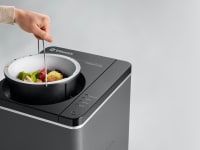Lomi composter review
This countertop composter is a fast, easy, and clean way to get rid of food scraps
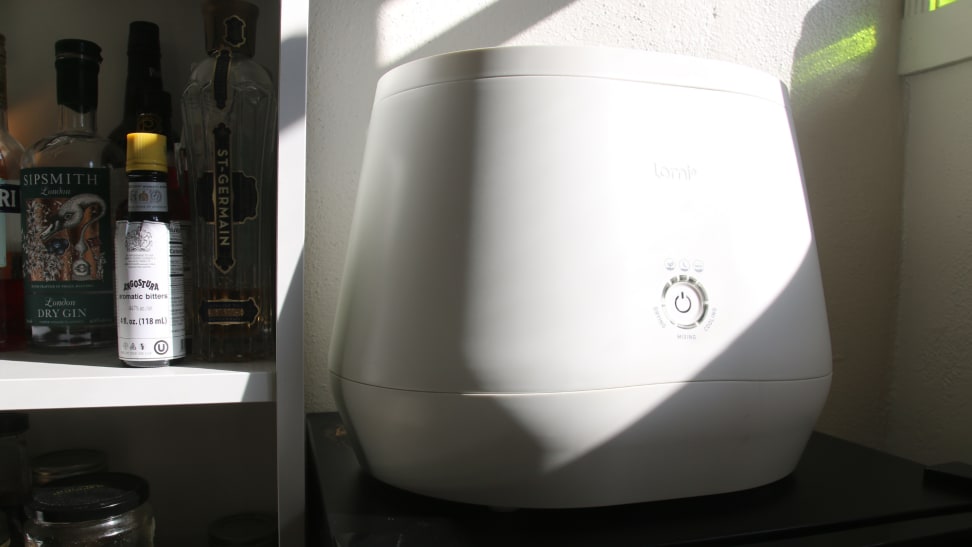 Credit:
Reviewed / Janelle Randazza
Credit:
Reviewed / Janelle Randazza
Products are chosen independently by our editors. Purchases made through our links may earn us a commission.
-

Pela Lomi
Pros
-
Easy to use
-
Easy to clean
-
Attractive
-
Compact
-
Can compost anything—even meat products
Cons
-
Price
-
The Lomi Classic composter promises to turn kitchen food scraps into nutrient-dense soil—without the smell, mess, or labor of a typical outdoor compost bin.
As someone who has always had a problem composting at home, I was intrigued about doing a Lomi composter review. Pela, the brand behind this countertop composter, claims you can reduce the volume of your waste by up to 90%.
My family recycles, we watch water consumption, we try to shop sustainably, and we make copious use of our community Buy Nothing groups. In spite of all of this, home composting is something we haven’t been able to pull off.
My family isn’t alone in this. Food waste is the largest category of material placed in municipal landfills daily, accounting for over 24% of landfill materials, according to the U.S. Environmental Protection Agency.
While food waste accounts for approximately 17% of methane gas emissions in the U.S., studies have shown that 72% of Americans do not compost their food waste. There is hope, however, as a Waste 360 study found that 67% of non-composters would be willing to do so if it were more convenient. The Lomi Classic composter hopes to bring convenience to household composting.
About Lomi composter
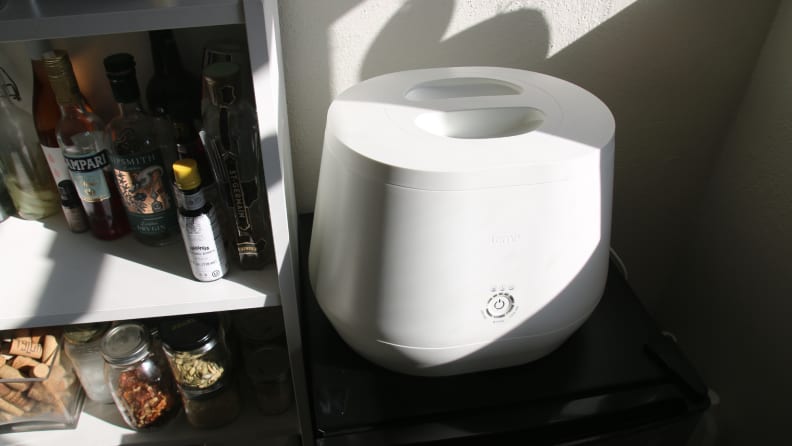
Lomi fit perfectly on the top of our wine fridge.
Lomi is a countertop composter that breaks down organic waste such as food scraps into small fragments that can either be used as soil, mixed with existing compost, or tossed into your green bin with other compostable materials, such as yard waste and grass clippings, to be taken to your city composting facility.
- Dimensions 16 x 13 x 12 inches
- Weight: 22 pounds
- Assembly: Not required
- How to clean: Bucket is dishwasher safe
- Finishes: White
- Capacity: 2 liters* User manual: Lomi user manual
How does the Lomi composter work?

In 20 hours or fewer Lomi produces nutrient-rich soil that can be used in your garden.
The Lomi composter turns food waste into nutrient-rich compost within a matter of hours, taking the smelliness, the messiness, and the labor out of the home composting process.
Essentially it cooks down and aerates everything—from produce, meat, dairy, and even Lomi approved bioplastics—while creating a microenvironment with perfect temperatures, oxygen, and moisture levels that would mimic the process that happens in your backyard compost bin—if you were a composting pro.
What can Lomi compost?
Composting can be quite an undertaking. The composting process is messy, smelly, and time-consuming—plus, it takes up a lot of space that many of us city dwellers don’t have. Different Lomi modes have different guidelines, but there are some items that are always safe to put in the Lomi—and some that you should never put in the countertop composter.
What can always go in Lomi?
Coffee grounds Eggs Eggshells Fruit scraps Leafy greens Legumes Oats Peels (soft, such as banana, citrus, potato) Plant trimmings and flowers Popped popcorn kernels Seafood Tea (loose-leaf) Tofu Vegetable scraps Yard trimmings
What can never go in Lomi?
Chicken, beef, pork bones Butter and cooking oils Conifer branches Cooked potatoes Fruit pits Human or animal waste Hygiene products Liquids Plastic lined bags Non-organic materials Pecan and walnut shells Unpopped popcorn kernels Styrofoam
What we like
It’s easy to use
There is virtually no learning curve with Lomi composter. All you do is fill it—keeping contents below the overflow line—lock it, and press “go.”

Nothing could be more simple. Just press the button and let the composting begin.
While Lomi is intuitive overall, we do recommend you read the instructions thoroughly to optimize your compost output. There’s no real need to figure out layering green and brown materials, though there are some tips for getting the most out of the compost it produces.
It’s versatile
One of the struggles I've previously had with composting was figuring out what can and can’t go into a compost pile. Could my salad with feta cheese go in my bin? How about this rice that has traces of chicken in it? It was confusing and seemed to really depend on the amount of time I could put into composting, which tends to vary by week for my family.
Since Lomi doesn’t sit outside and isn’t subject to animals sniffing around, a far greater variety of things can go into it with ease than go into a traditional compost bin. You can, of course, add coffee grounds, fruits, and vegetables, but you can also add meat scraps and dairy products. You can also add in green materials from your house plants if you desire.
Additionally, Lomi has a list of approved bioplastics that can be broken down into your compost mix.
It’s sanitary
Over the three weeks that I tried Lomi, it took anywhere from two to four days for my family of three to fill the 2-liter bucket with kitchen scraps and leftover food. I was pleasantly surprised at how good it was at containing smells and at keeping fruit flies at bay. Even when the inside bucket smelled of putrid rotting food the device's carbon filters and the tightly locking lid completely contained the smell.
In the past, my family used a small composting bin on our kitchen countertop, and it always ended up smelling and releasing flies when we opened it. Lomi can function as both your compost bucket and your composter, which helps to minimize mess. Plus, you don’t have to deal with backyard flies—which can be particularly problematic for city dwellers with cramped property lines.
If things get a bit messy, you can wipe the exterior of the Lomi with a damp cloth. The bucket is dishwasher safe.
The size is right
The Lomi composter is about the same size as a large crockpot or a bread-making machine—an upgrade from an outside composter. We keep ours on top of our wine fridge and an apartment-dwelling friend keeps hers under her kitchen sink. All you need is enough room surrounding Lomi to allow for proper airflow during the heating process.
It’s fast
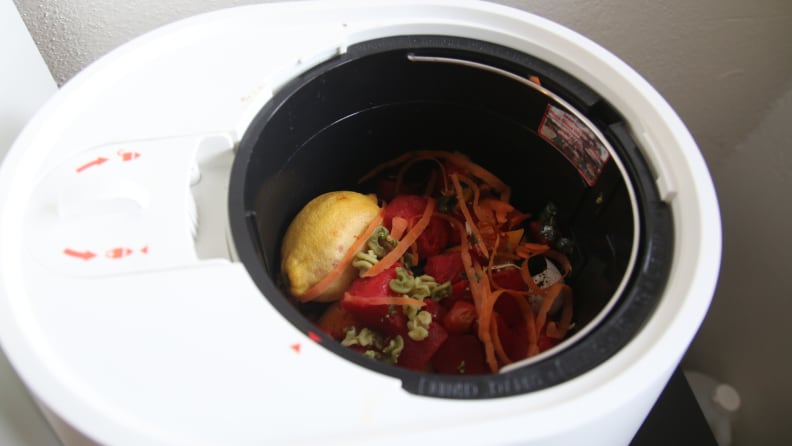
Lomi turns food scraps into soil in hours.
Lomi has three modes. If you just want to get food waste out of your kitchen, the eco express mode is the fastest way to compost. It takes only three to five hours and produces dirt that can go right into your green bin.
If you want to compost bioplastics and packaging, Lomi Approved mode works in five to eight hours and also produces dirt you can put in your green bin. To make actual nutrient-rich compost, Lomi Grow mode takes 16 to 20 hours and the soil produced can go into your house plants or vegetable garden.
Also included with Lomi is a bag of 45 Lomi Pods, to be used during its Grow cycle, which are tablets that include a proprietary blend of probiotics. These probiotics help to improve the speed of degradation, reduce smell, and improve the soil output when added to the composting cycles.
While it takes almost a full day to get garden-ready compost, that’s a far cry from the weeks or months you might get from a backyard bin, and it’s entirely hands-off.
What we didn’t like
It may not be right for everyone
Reviewed’s chief scientist, David Ellerby, does question the need of the Lomi electric composter for most homeowners. He points out that it uses energy on a process that could otherwise be done with no carbon footprint. He argues that Lomi is only useful for a niche of people: apartment-dwellers and those who don’t have a food waste program in their city.
My family, however, fits perfectly into that niche. We don’t have a municipal food compost program and, while we do have a yard, our cramped property lines would mean flies that our neighbors would have to deal with (I can already hear the complaints).
It’s pricey
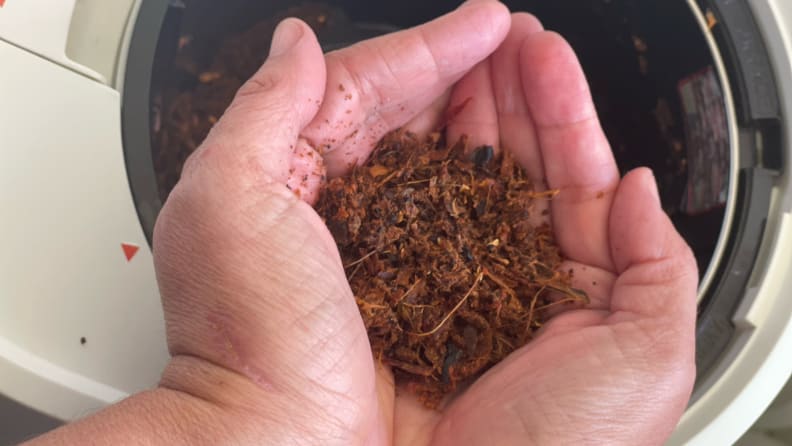
From food to dirt! This cycle took three hours and will go in my green bin on recycling day.
As with most products that are at the forefront of newer technology, Lomi is expensive. At a price tag of about $500, the cost is prohibitive to many—arguably the people that may need it the most.
Hopefully, the price will go down in years to come, or a base-level model will be developed to be sold at a more accessible price point. That said, if you care about global warming and are able to save your pennies, we consider this a very worthwhile splurge.
Should you buy the Lomi countertop composter?
Yes
We were pretty surprised when we saw how much food waste we put into the trash each week. When you consider the amount of methane that our food waste emits and the overall damage it’s doing to the environment, this is definitely a device worth saving for.

The original Lomi electric composter is fast, versatile, and easy to use.
The product experts at Reviewed have all your shopping needs covered. Follow Reviewed on Facebook, Twitter, Instagram, TikTok, or Flipboard for the latest deals, product reviews, and more.
Prices were accurate at the time this article was published but may change over time.



